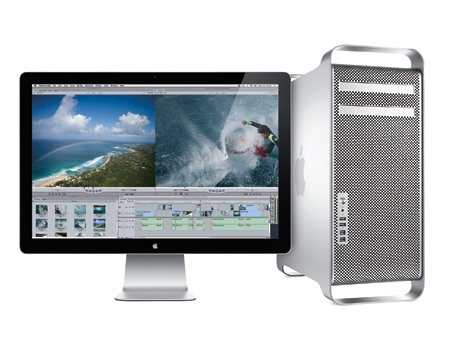Why you can trust TechRadar
In our benchmarking tests, the new Mac Pro performed admirably. Using MAXON's Cinebench to test its 3D rendering capabilities, the advantage offered by the Xeon's multiple cores became very apparent indeed.
Compared with the 3.2GHz mid-2010 iMac, the Mac Pro was just under 3 per cent slower using a single core. But when all available processors were brought into play, it outperformed the all-in-one by an incredible 67.5 per cent.
For our gaming test, we ran the notoriously system-hungry Doom 3 with the graphics options turned up to maximum. It gave us almost 180 frames per second, an increase of almost 34 per cent over the 3.2GHz Core i3 iMac. It encoded our five-minute test movie to iPod format in just 129 seconds too, 31 per cent faster than the iMac.
Although designed for professionals, there's clearly an advantage in having a Mac Pro as a home machine.
Perhaps the most surprising (though extremely welcome) test result came when we timed how long it took iTunes to rip and encode our test CD. For a long time this test has been stuck at around 380 seconds, as a series of Macs under test failed to capitalise on incremental power increases due to the limitations of the standard 8x SuperDrive.
Thankfully, the Mac Pro uses a faster optical drive – specifically an 18x dual layer-compatible SuperDrive introduced with the previous generation of Mac Pros. Our test CD was ripped and encoded in 177 seconds, a little under half the time taken by the 8x optical drive used in the rest of the Mac range. These figures suggest the optical drive is still the limiting factor, but this is hardly surprising.
The Mac Pro has two optical drive bays, only one of which is populated. You can add a second SuperDrive if you wish, although Apple still hasn't seen fit to give us a Blu-ray option.
To be fair we weren't expecting one, though – the Cupertino-based company simply isn't interested in high-density optical storage, and prefers to promote its HD movie downloads through iTunes to facilitating Blu-ray movie playback on the Mac. But expected or not, it's still annoying.
One thing Mac Pro owners won't find annoying is background noise. The new machine runs almost silently, even with the optical drive running at full speed and the processors working hard. This is also true for the new iMacs and Mac mini, and is something Apple has definitely got right of late.
Current page: MacPro 2.8Ghz quad-core: Performance
Prev Page MacPro 2.8Ghz quad-core: Specs Next Page MacPro 2.8Ghz quad-core: Verdict